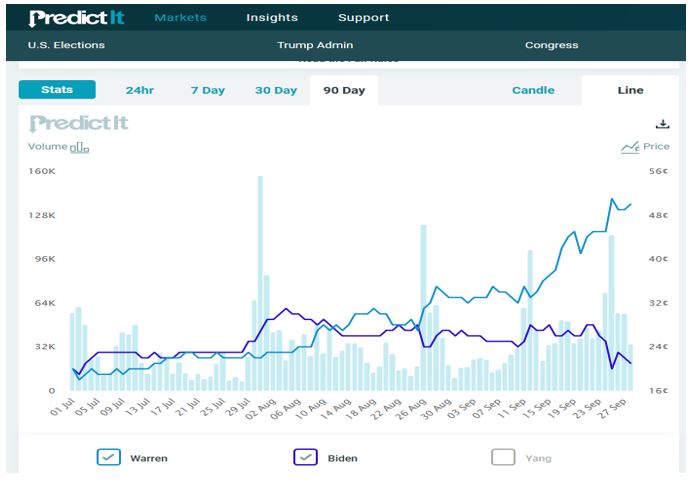From Jonathan Bayes, consultant Chief Investment Officer, Bentleys Wealth Advisors
The past week has left little to discuss regarding global growth. Recent data was mixed; with some softening in US consumer confidence, but there’s little else to report.
China’s Vice Premier Liu He is reported as planning to visit the United States for the next round of trade talks next week on October 10th.
Over the weekend the Trump Administration floated the idea that they could enforce restrictions on portfolio investment flows by US firms into China and potentially even restrict access to US capital markets for Chinese-controlled entities.
Whilst any imposition of such restrictions was said to be a long way off, the suggestion was enough to cause a significant scare to investors who marked down the share price of major NASDAQ-listed Chinese stocks on Friday night – Alibaba (BABA) was down -5% as an example.
There’s increasing evidence of local investors reducing share-market risk. We have begun to similarly move to higher cash holdings after the ASX200’s stellar year-to-date rise
In the past fortnight we have reduced exposures to Westpac (WBC) and BWX (BWX) after their strong respective rises.
We fear WBC is likely to cut its dividend come results in November, and in the case of BWX, the share price has doubled in under 2 months.
Beyond our own moves, it is worth noting that recent market high flyers such as Clinuvel (CUV), Appen (APX), Pro-Medicus (PME) and Nearmap (NEA) are down some -30% to -40% in barely a few months and on no news – indicative of a market in which investors are locking in speculative gains.
Economic data released
Chinese September manufacturing data was flat on last month with little worth mentioning.
Australian Private Sector credit for August rose at its slowest annual rate since 2011 and Australian broad money growth collapsed back to near its lowest level since the 1990’s recession also.
Private sector credit grew at +2.9% and Australian M3 money supply a measly +1.9% in the 12 months to August, highlighting that even in spite of the multiple interest rate cuts, domestic money supply remains significantly constrained.
Observations from the past week
Nufarm (NUF)
Nufarm this morning positively surprised the market with a left-field announcement it had sold its profitable Latin American crop protection business to major shareholder Sumitomo Chemical for almost $1.2bn.
As I type, the shares are +27% having opened +50% higher initially.
Understandably the news is extremely positive in that it alleviates NUF’s balance sheet issue in one fell swoop, but also that it involves the sale of a major business unit on roughly 2x the multiple the wider group had been previously trading on in market.
Whilst there are swings and roundabouts in terms of the impact on NUF going forward, the significantly de-geared nature of the business following this sale trump’s any earnings dilution felt, particularly since investors will soon begin focusing on the potential earnings growth from NUF’s omega-3 infused canola seed that today the company confirmed would begin contributing to profit in 2021.
The shares today stand at around 10-11x forward earnings, but on an infinitely healthier balance sheet and with material prospect for improving earnings from its seed’s operation and from the recent European patent acquisitions made in 2018.
Downer (DOW)
Downer was in the press last week with suggestions it could put the Spotless Laundries business up for sale.
Considering that it is widely expected to sell its contract mining business in the coming year, the additional sale of Spotless Laundries could take the potential total asset sale proceeds for DOW to well over $1bn and a likely share buyback of substance.
We think momentum in DOW remains strong and that the stock is well placed to push towards $9 in the coming year.
What’s interesting?
All investors should be paying close attention to US Presidential election issues even in spite of the fact the election itself is not until November next year.
This is because its impact will be felt in markets well before then, and likely as early Q1 2020 when the initial Democrat caucuses commence (Iowa is February 3rd and New Hampshire a week later).
The reason we are focused on the Democrats is because two of the leading candidates to face off against President Trump, Senators Elizabeth Warren and Bernie Sanders, support policy in favour of greater government regulation, expanded national healthcare, free college tuition and higher taxes on wealthy individuals.
With an economy and share-market hugely attuned and linked to low regulation and the significant corporate profitability this has engendered, any prospect that either of Senator Warren or Sanders could usurp President Trump will be extremely closely monitored by investors.
In fact, the surge by Elizabeth Warren in the polls over the past few months, should have investors paying attention (see the chart below from Predictit.org) as a Warren presidency would likely cause not only a significant share-market fall, but potentially even a medium-term sell-off in government bond markets as well.
Senator Warren is running on a platform that promises to levy a 2% ‘wealth tax’ on those whose net worth is over US$50m and to spend these funds on providing free college tuition and a concept, as yet undefined, of nationalized healthcare.
She is a fierce consumer advocate and a supporter of increased corporate regulation and is also promising to provide increased distance between vested interests (corporate lobbyists) and US policymaking.
US Democratic Candidate ‘market movements’ – Warren surging ahead of Biden

Looking ahead
- Monday – AU Private Sector Credit (Aug), CH Manufacturing & Non-Manufacturing PMI (Sep), US MNI Chicago PMI (Sep)
- Tuesday – AU Australian Industry Group Manufacturing survey (Sep), AU CBA Manufacturing survey (Sep), AU Building Approvals (Aug), AU RBA Meeting, US ISM (Sep)
- Wednesday – US ADP Employment (Sep)
- Thursday – AU Australian Industry Group Services survey (Sep), AU CBA Services survey, AU Trade Balance (Aug), US Markit Services PMI (Sep)
- Friday – AU Retail Sales (Aug), US Employment (Sep)
Friday 5pm values
| Index | Change | % | |
| All Ordinaries | 6824 | -15 | -0.2% |
| S&P / ASX 200 | 6716 | -15 | -0.2% |
| Property Trust Index | 1618 | +13 | +0.8% |
| Utilities Index | 8142 | +38 | +0.5% |
| Financials Index | 6523 | +27 | +0.4% |
| Materials Index | 13277 | -256 | -1.9% |
| Energy Index | 10798 | -107 | -1.0% |
Friday Closing Values
| Index | Change | % | |
| U.S. S&P 500 | 2962 | -30 | -1.0% |
| London’s FTSE | 7426 | +81 | +1.1% |
| Japan’s Nikkei | 21879 | -200 | -0.9% |
| Hang Seng | 25955 | -481 | -1.8% |
| China’s Shanghai | 2932 | -74 | -2.5% |
Key Dividends
| Mon 30th September 2019 | Div Ex-Date – N/A
Div Pay Date – Woolworths (WOW), WBCPG |
| Tue 1st October 2019 | Div Ex-Date – N/A
Div Pay Date – Boral (BLD) |
| Wed 2nd October 2019 | Div Ex-Date – N/A
Div Pay Date – Downer (DOW) |
| Thu 3rd October 2019 | Div Ex-Date – N/A
Div Pay Date – Corporate Travel (CTD), SEEK (SEK) |
| Fri 4th October 2019 | Div Ex-Date – NABPD
Div Pay Date – Crown (CWN), QBE (QBE) |
Tuesday 1 October 2019, 4pm
For more information on the above please contact Bentleys Wealth Advisors directly or on +61 2 9220 0700.
This information is general in nature and is provided by Bentleys Wealth Advisors. It does not take into account the objectives, financial situation or needs of any particular person. You need to consider your financial situation and needs before making any decisions based on this information.



